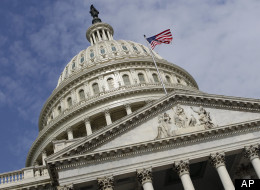Philadelphia Inquirer – August 8, 2011
Americans love to sound off about the shortcomings of our government. Thanks to the First Amendment, we’re allowed to. We have the right to air our opinions and to criticize the system. We don’t have the right to get results. And that’s a good thing.
When legislative attempts to solve problems go nowhere, many of us pull at our hair, call Washington dysfunctional, and bemoan the lack of “political will.” But that’s the beauty of checks and balances. We live in a huge, heterogeneous republic. We don’t get exactly what we want, and neither do they, whoever “they” may be.
Even with the White House and majorities in the House and Senate, Democrats struggled to pass their health-care bill last year. Its final form included plenty of compromises, and there have been conflicting court rulings on its constitutionality.
More recently, many of the lawmakers who voted for the Budget Control Act of 2011, the legislation raising the debt ceiling, were less than happy with its final form. But both parties were able to claim a partial victory, while the most contentious issues were, as usual, put off until after the next election.
To help U.S. history students appreciate our intentionally convoluted lawmaking process, the teachers at my school have them read several pieces of legislation, including the Sherman Antitrust Act of 1890. Over the last century, the act has become a foundational component of American antimonopoly law. But it sure didn’t start out that way.
In the 1890s, the industrial cartels targeted by the act turned it on their enemies, the unions. Their lawyers argued that in shutting down factories, railroads, and mines, organized strikes were, in the words of the act, “combinations in restraint of trade.” And the courts agreed!
Why did an antitrust act become an anti-organized labor act? Because the trusts had lots of congressmen in their pockets, and because the middle class feared organized labor as much as it did big business.
Years passed before there were any serious attempts to break up monopolies under the act. And it was almost a quarter-century before there was an antitrust act that explicitly protected unions. The slow pace of change reflected society’s conflicting views on the subject.
And we’re still undecided: Witness the debate over what should be done about the big banks in the aftermath of the collapse of Bear Stearns and Lehman Bros., or the more recent battles between public-sector unions and state governments in the Midwest.
We can’t expect the government to fix things when the citizens don’t agree on what’s broken. Will the growing national debt lead to economic disaster? Or would it be more dangerous to cut government spending when the economy is so weak? There’s no consensus on the answer.
Despite its name, the Budget Control Act does not impose much control over the budget. U.S. debt is likely to keep growing for the foreseeable future. But someday we might be as serious about budget control as we eventually were about restricting monopolies.
In announcing its downgrade of U.S. debt, Standard & Poor’s was moved to criticize “political gridlock.” But what’s the alternative? We should be grateful that the politicians we elect are willing to work within a system designed to keep them from getting much done.


Grant Calder’s respect for the checks and balances of the Constitution (Gridlock is Good, 8/19) outweighs his own sense of history and common sense. We had a much more serious disagreement about Civil Rights and Voting Rights in the 1960’s which led to riots and widespread destruction of neighborhoods from which some areas of our country have yet to recover. Yet legislators of good will refused to kick the can down the road, and passed far-reaching legislation. We have twice recently reached the point where Congress considered impeaching a president. Yet people found a way to do the responsible thing, and promote Gerald Ford, and to censure Bill Clinton. The recent gridlock is different in both style and substance. It is the politics of a TV-conditioned public, which wants answers in 60 minutes, too easily convinced by sound-bites that soap-powder sloganeering is all they need to understand.
Ben Burrows
Ben –
I think one could argue that your first example works for my argument too.
It took a hundred years, more or less, for Congress to “do the right thing” and pass legislation that gave teeth to the 14th and 15th amendments, and for the executive branch to begin to enforce it.
For decades before that the legislative and executive branches did nothing substantial to support civil rights for African Americans and in some cases the courts actively supported segregation.
It’s the same as the Sherman Anti-Trust Act.
I’m not sure how you mean the Ford case. I assume you’re talking about impeaching Nixon. But, why would that have been a bad thing? My sense is that he resigned only because he knew the alternative was impeachment.
Bill Clinton was impeached (by the House), but not convicted (by the Senate), which is a perfect example of checks and balances working.
His impeachment was a case of the exactly the kind of “soap-powder sloganeering” you are talking about. They went after him for not telling the truth about his fooling-around with a White House intern?! Seems as though the time could have been better spent, but the public loved it. There was plenty of righteous indignation all around.
Grant
Interesting thesis and, to some extent, superficially true. However, you miss the point when you excuse the government from acting with dispatch because of public indecision. That is exactly the reason we have a representative republic form government and not a one-person, one-vote on all issues pure democracy. We empower our leaders to go against public pressure and polling data when they are convinced that it is in the best interests of the country that the majority of citizens should not rule on a particular topic. However, instead of using this power to advocate potentially unpopular though necessary legislation (such as placing constraints on entitlement programs), most of our always campaigning legislators simply go with the flow, favoring their own reelections over the good of the country. Congressional term limits would be a good start but, until the public starts to pay attention and becomes more informed about how government functions and what it is doing, we will continue to lose the essence of what this country was and should be.
Fred –
I agree with you completely that the lack of serious interest in government on the part of the public is the most important limiting factor.
On the other hand, those who are concerned often have very strong feelings about what Washington should be doing and put a great deal of pressure on their representatives. That’s why I’m glad that the system is so inefficient. At least they don’t have their way while the rest of us aren’t paying attention.
Thanks for the response Grant. I agree that inefficiency is better than the alternative of being ruled by well funded special interest groups and lobbyists; but what a sad statement to make. Is this the best thing we can say about what our system has devolved to? If the public spent as much time focusing on governance as they do sports, TV and the internet who knows what might happen? I know it’s unlikely to ever be the case as our populace continues to get more distracted by so many competing attention grabbers, but it doesn’t hurt to dream. One belief I hold firmly is that the larger government gets, the smaller “We The People” become.
It would be nice if the public spent more time, as you say, focusing on governance.
One of the things I love about studying history is that it provides such great perspective on the present. The last quarter of the 19th century, for example, had much higher voter participation in national elections than we do now, but interestingly, there probably wasn’t another time in the nation’s history when the special interests exercised more influence.
Politics was entertainment then, when there was no TV or internet, but it’s not clear that the public was any more thoughtful about the big issues.
I agree with you that when governments get as big as ours it’s hard to feel as though we have any significant input.
The system is fine, it is the “us verses them” mentality of the 2 parties which has destroyed progress. Combine that with a President completely incapable of negotiating compromise and here we sit. As much as George Bush was disliked by the left, he was highly effective at gaining bi-partisan support for his major initiatives. The key to the having the checks & balances working for the people is to have a moderate & respected leader in the White House, who is capable of facilitating compromise. Currently, we have the opposite in that position.
I see your point. It does seem as though Obama’s tone has become increasingly irritable and that being able to stay above the fray, no matter what, and be seen as the person who remains steady through it all, is the best way to take advantage of the presidency to, as you say, facilitate compromise.
Congratulations! You have pointed out what all the pundits have overlooked – congress reflects the people who elected its members. Runaway government has been hoisted by its own petard! It’s back to the constitution, that wiser men than we now have as leaders, put in place at the birth of the nation.